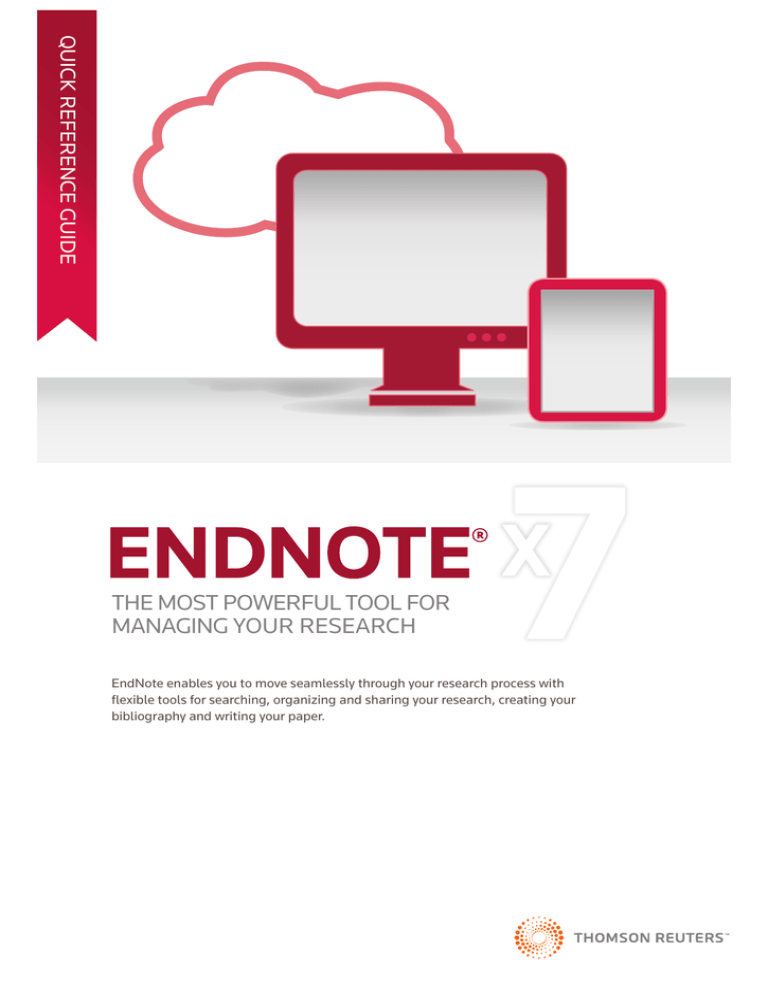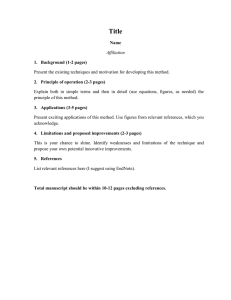
QUICK REFERENCE GUIDE
THE MOST POWERFUL TOOL FOR
MANAGING YOUR RESEARCH
EndNote enables you to move seamlessly through your research process with
flexible tools for searching, organizing and sharing your research, creating your
bibliography and writing your paper.
QUICK REFERENCE CARD - ENDNOTE
WHAT CAN YOU DO WITH ENDNOTE?
• Create a customized library of all your references.
• Insert those references in Word, Apache OpenOffice Writer
(only compatible with Windows), or Wolfram Mathematica
8 and EndNote will automatically create citations and a
bibliography matching the requirements of your selected
journal or style manual—and it has over 5,000 bibliographic
styles to choose from!
• Attach PDFs, sound files, videos, or any other kind of file to
your references—up to 45 files per record!
• Read and annotate attached PDFs.
• Organize your library using groups to categorize references
by project, subject, or anything else you choose—and the
same reference can be in as many groups as you want.
• Synchronize your EndNote references, custom groups, and
group sets across multiple computers, share references with
others, and access your references from almost anywhere
with any Internet browser by logging into your EndNote
account online at my.endnote.com
• And much, much more!
BUILD YOUR LIBRARY OF REFERENCES
Import your PDFs, download references from online databases or manually enter your
references. Have EndNote find the full text article for you or manually attach the PDF
yourself. Mark your references with a Read/Unread tag and apply ratings to help you
identify the more important references.
ORGANIZE YOUR
REFERENCES
Create groups and
drag and drop your
references into them. Or
create automatic smart
groups and let EndNote
take care of this for you.
YOUR REFERENCES
IN THE CLOUD
Have EndNote on multiple
computers? Create an
EndNote account online
and sync your references to
wherever you have EndNote.
Share your references with
colleagues quickly.
2
VIEW AND ANNOTATE YOUR PDFS. EDIT
YOUR REFERENCES.
Add sticky notes to your PDFs and search
for them later. Use the built-in email
functionality to quickly share a reference and
its file attachments with others.
QUICK REFERENCE CARD - ENDNOTE
GET STARTED IN 5 STEPS.
1
: CREATE YOUR LIBRARY
From the Getting Started window click on the
“Create a new library” button. Or go to the File
menu > New Library.
Save your library in your Documents folder.
2
: IMPORT YOUR PDFS
If you already have PDFs of full
text articles on your computer, you
can start by importing them into
your EndNote library. With your
library open go to File > Import
to import one PDF or a folder of
PDFs, or set a folder for autoimport of PDFs in the preferences.
3
QUICK REFERENCE CARD - ENDNOTE
3
: DOWNLOAD REFERENCES INTO YOUR LIBRARY
Many online databases give you the ability to export references to your EndNote library. Look for the option
to save, export, or send to EndNote. The EndNote option might also be labeled as “RIS.”
: ORGANIZE YOUR
REFERENCES INTO GROUPS
4
GROUPS: Go to Groups > Create Group. This creates a group
with a folder icon on the left. Give your group a name. Drag
and drop references from your library into this group. The
same reference can appear in multiple groups and is not
duplicated when you do this.
SMART GROUPS: Go to Groups > Create Smart Group. Define
a search parameter and give this group a name. Click on
the Create button. A Smart Group will automatically show
references that match that search. This group will also instantly
update as you add more references to your library that match
that original search.
COMBINED GROUPS: Explore the relationships between
your existing Groups. Go to Groups > Create From Groups.
Pick at least two groups in the drop-down menu and select
your Boolean operator of choice. Give this group a name,
click on the Create button, and a Combined Group will
appear on the left. This group is also a smart group and will
update as your component groups change.
4
QUICK REFERENCE CARD - ENDNOTE
5
: CITE REFERENCES IN WORD
Powered by patented CITE WHILE YOU WRITE™ technology
Now that you have some references in your
EndNote library, you can start to cite them
in your documents.
OPEN A DOCUMENT IN WORD and use the
following Cite While You Write commands
to insert citations, edit citations, and
change styles as needed:
FIND & INSERT MY REFERENCES:
Place the cursor in your document
where you would like a citation to
appear. Use this command to search
for a reference in your EndNote
library and insert it into your paper.
STYLE: Use the style dropdown
to pick a style from among your
favorite styles, or choose Select
Another Style to see a bigger list of
styles. More styles are available for
download at endnote.com
EDIT AND MANAGE CITATIONS:
Use this command to edit specific citations:
Change the formatting
of your in-text citations.
Add a prefix, suffix, and/or
pages to your in-text citations.
Remove Citations.
5
QUICK REFERENCE CARD - ENDNOTE
SYNC YOUR REFERENCES, CUSTOM GROUPS, AND GROUP SETS
You can automatically sync your desktop and web references,
attachments, and custom groups, so one can be accessed from the other.
EndNote online
EndNote on desktop
6
QUICK REFERENCE CARD - ENDNOTE
DID YOU KNOW...?
ENDNOTE CAN FIND THE FULL TEXT ARTICLE FOR YOU.
If you have access to PubMed LinkOut and/or OpenURL,
you can point EndNote to these resources when you run the
Find Full Text feature. In the EndNote preferences go to the
Find Full Text setting and check the PubMed LinkOut box.
Enter your OpenURL server in the OpenURL Path box. If
you have an EZProxy server, put that into the Authenticate
with box.
To run Find Full Text, select one reference or multiple
references in your library. Then use the Find Full Text
button in the toolbar or go to References > Find Full Text.
YOU CAN MANUALLY ENTER REFERENCES.
You won’t be able to find everything online. To enter a
reference manually, go to References > New Reference.
This will open a new reference window for you to start
typing (or pasting) into the fields. Here are some guidelines
on entering references:
1.
Set the reference type in the drop-down
menu at the top of the record window.
2. Enter author names as follows:
Smith, John Oscar (Last name, First name)
Smith, J.O. (Initials separated by periods)
Center for Disease Control and Prevention,
(Add a comma at the end of corporate names)
For multiple authors enter each new author
on a new line within the Author field.
Share a reference
and its file
attachments
Add annotations
that are searchable
in EndNote.
YOU CAN VIEW AND ANNOTATE YOUR PDFS
View the PDF attached to your reference in the Reference Panel on the right, or use
the Open PDF/Close PDF toggle button to view it in full screen mode.
7
QUICK REFERENCE CARD - ENDNOTE
NEED HELP?
ADDITIONAL TRAINING
Whether you want to get the basics or fine tune your skills, Thomson Reuters can help with
a variety of targeted training opportunities which include recorded trainings, live expert-led
WebEx sessions and downloadable materials at endnote.com/training
GETTING TECHNICAL HELP
Search our Frequently Asked Questions Knowledgebase or contact our expert technical
support staff at endnote.com/support/
One of the most important benefits of EndNote is our knowledgeable and committed user base.
Follow us on Twitter, Like us on Facebook or join our customer forum to ask questions and
get feedback from our millions of users around the world.
http://community.thomsonreuters.com/
Science Head Offices
Americas
Philadelphia +1 800 336 4474
+1 215 386 0100
Europe, Middle East and Africa
London +44 20 7433 4000
Asia Pacific
Singapore Tokyo +65 6775 5088
+81 3 4589 3100
For a complete office list visit:
ip-science.thomsonreuter.com/contact
S SR 1203 038
Copyright ©2013 Thomson Reuters. All rights reserved.


